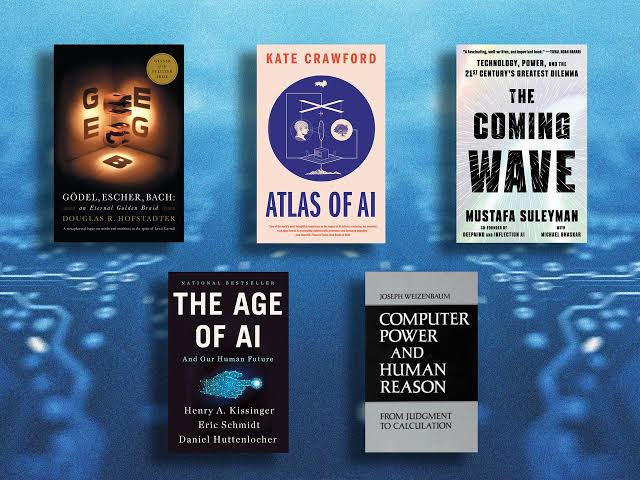Artificial intelligence (AI) has become one of the most transformative technologies of the 21st century. Influencing various aspects of our daily lives and driving innovation across industries its impact is undeniable. Whether you're a beginner looking to understand the basics or an experienced practitioner seeking to deepen your knowledge, there is wealth of literature available on the subject. Here is an extensive list of the top 10 artificial intelligence books to read. These books cover a range of topics from fundamental concepts to advanced applications.
Before diving into specific books it is important to understand what artificial intelligence entails. AI refers to the simulation of human intelligence in machines. These machines are programmed to think, learn and solve problems. This field encompasses various subfields. Some of these include machine learning neural networks, natural language processing and robotics. The following books will provide a comprehensive overview of these areas and more.
Artificial Intelligence: A Modern Approach by Stuart Russell and Peter Norvig
Widely regarded as the most comprehensive textbook on the subject, "Artificial Intelligence: A Modern Approach" by Stuart Russell and Peter Norvig covers a broad spectrum of AI topics. The book delves into search algorithms, machine learning, knowledge representation, reasoning, and robotics. Its clear explanations and practical examples make it a valuable resource for both students and professionals.
Deep Learning by Ian Goodfellow, Yoshua Bengio, and Aaron Courville
"Deep Learning" by Ian Goodfellow, Yoshua Bengio, and Aaron Courville is a seminal work in the field of deep learning, a subset of machine learning that focuses on neural networks with many layers. This book provides an in-depth introduction to the mathematical foundations, techniques, and applications of deep learning. It is an essential read for anyone looking to understand the intricacies of neural networks and their practical uses.
Superintelligence: Paths, Dangers, Strategies by Nick Bostrom
Nick Bostrom's "Superintelligence: Paths, Dangers, Strategies" explores the potential future of AI and its implications for humanity. The book discusses the concept of superintelligent machines, their possible impact on society, and the ethical considerations that arise. Bostrom's thought-provoking analysis makes it a must-read for those interested in the long-term consequences of AI development.
The Master Algorithm: How the Quest for the Ultimate Learning Machine Will Remake Our World by Pedro Domingos
In "The Master Algorithm," Pedro Domingos presents the idea of a universal algorithm that can learn any task from data. The book explores five major schools of thought in machine learning and discusses their strengths and weaknesses. Domingos' engaging writing style and practical insights make complex topics accessible to a broad audience.
Human Compatible: Artificial Intelligence and the Problem of Control by Stuart Russell
Stuart Russell's "Human Compatible" addresses the challenge of ensuring that advanced AI systems act in ways that are beneficial to humanity. The book explores the risks associated with AI and proposes a new approach to AI development that prioritizes human values and safety. Russell's expertise and clear explanations make this an important read for anyone concerned about the ethical implications of AI.
Life 3.0: Being Human in the Age of Artificial Intelligence by Max Tegmark
"Life 3.0" by Max Tegmark examines the future of AI and its potential to transform society. Tegmark explores the possibilities and risks associated with AI, from job automation to the creation of superintelligent machines. The book also delves into philosophical questions about consciousness and the nature of intelligence. Tegmark's accessible writing and compelling arguments make it a thought-provoking read.
Artificial Intelligence: The Basics by Kevin Warwick
For those new to the field, "Artificial Intelligence: The Basics" by Kevin Warwick provides a concise and accessible introduction to AI. The book covers fundamental concepts such as expert systems, neural networks, and robotics, making it an ideal starting point for beginners. Warwick's clear explanations and real-world examples help demystify complex topics.
Machine Learning Yearning by Andrew Ng
"Machine Learning Yearning" by Andrew Ng is a practical guide to building effective machine learning systems. The book focuses on the process of developing and deploying machine learning models, offering valuable insights into best practices and common pitfalls. Ng's extensive experience and practical advice make this a valuable resource for practitioners and aspiring data scientists.
Prediction Machines: The Simple Economics of Artificial Intelligence by Ajay Agrawal, Joshua Gans, and Avi Goldfarb
"Prediction Machines" by Ajay Agrawal, Joshua Gans, and Avi Goldfarb explores the economic impact of AI and its potential to revolutionize industries. The book discusses how AI can be used to make predictions and decisions, transforming business models and creating new opportunities. The authors' clear explanations and real-world examples make this a valuable read for business leaders and policymakers.
The Hundred-Page Machine Learning Book by Andriy Burkov
For those looking for a concise yet comprehensive overview of machine learning, "The Hundred-Page Machine Learning Book" by Andriy Burkov is an excellent choice. The book covers essential topics such as supervised and unsupervised learning, neural networks, and model evaluation. Burkov's clear and concise writing makes complex concepts accessible, making it a great resource for beginners and experienced practitioners alike.
Conclusion: Embracing the Future of AI
In conclusion, the field of artificial intelligence is vast and constantly evolving, offering a wealth of knowledge and opportunities for those willing to explore it. The books listed above provide a comprehensive overview of AI, from foundational concepts to advanced applications and ethical considerations. By reading these books, you will gain a deeper understanding of AI and its potential to transform our world. Embracing this knowledge is crucial as we navigate the future of technology and its impact on society.
